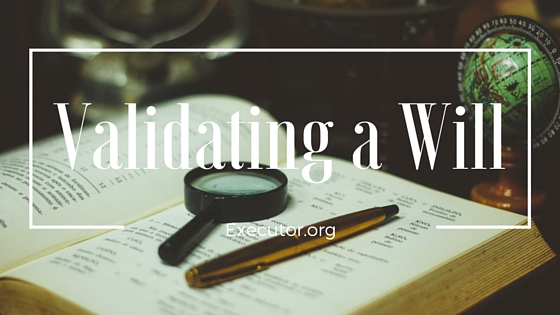
How to Tell if a Will is Legal and Valid – Executor Duties 101
“How to Tell if a Will is Legal and Valid” is part of the Executor Duties 101 series, an occasional series by Executor.org that highlights steps in the process of settling an estate.
One of the first duties of an executor after a person dies is determining if they had a will and if so, is it valid?
Assuming you have located a will, you will now need to determine if it is legal. Ultimately, the only person who can determine the validity is a probate judge, but there are several questions you can ask to determine whether the validity of the will may be challenged. These include:
Was the will prepared by an estate attorney?
Chances are, if you are working with a will prepared by an estate attorney, you probably have a valid document. But today, given that most Americans have access to the internet, many people are using online will-writing services or writing up their own after doing some online research.
While these wills may be ruled valid, keep in mind that different states have different laws governing whether a person can write their own. Even if a particular state says it’s OK for a person to write their own will, the state may have specific requirements, such as the will must be entirely handwritten by the author (this is called a holographic will) or it must be signed in the presence of witnesses.
And remember, it is the laws of the state of the will writer, not the state in which the executor lives, that apply in this situation.
Are there multiple wills?
Because things can change over the course of a person’s life, a will can be revised or rewritten entirely. For example, life events such as marriage, divorce, death of a heir, and birth of children can all prompt a revision. Typically, the most recent one will be the one that is considered legal. But if multiple wills exist, things can be more complicated and open to dispute.
Are beneficiaries challenging the will in question?
Heirs might argue a will is not valid for several reasons. For example, they might recall verbal conversations with the deceased before they died that contradict the will. Or they might feel that they should inherit more than what is included in the written document. Objections from beneficiaries can lead to challenges in probate court that can complicate your work as executor.
So what can you do if you fear the will’s validity might be in dispute? There are a few steps you can take.
First, if the will in hand was prepared by a lawyer still practicing, reach out to them to discuss whether they are aware of any revisions or later versions. If you don’t know who prepared the document, it can be wise to contact an attorney who specialized in estate (also called probate) law and ask their opinion.
It also can be useful to take the time to talk to the beneficiaries about the will. By doing so, you may learn that other wills exist and/or get a sense of whether they might dispute the will in probate court.
In many cases, proving the validity of a will is simple. But taking the time to consider the above can not only help you prepare for and deal with potential issues, but ensure you are following the writer’s wishes.
At Executor.org, we can help you through the executor role. There are more than 100 steps in the process, and it can be stressful not knowing if you’ll miss some of them. Click here to create a custom plan to guide you, step-by-step, through the settling of an estate.
Use our tool to simplify the process and minimize your stress.